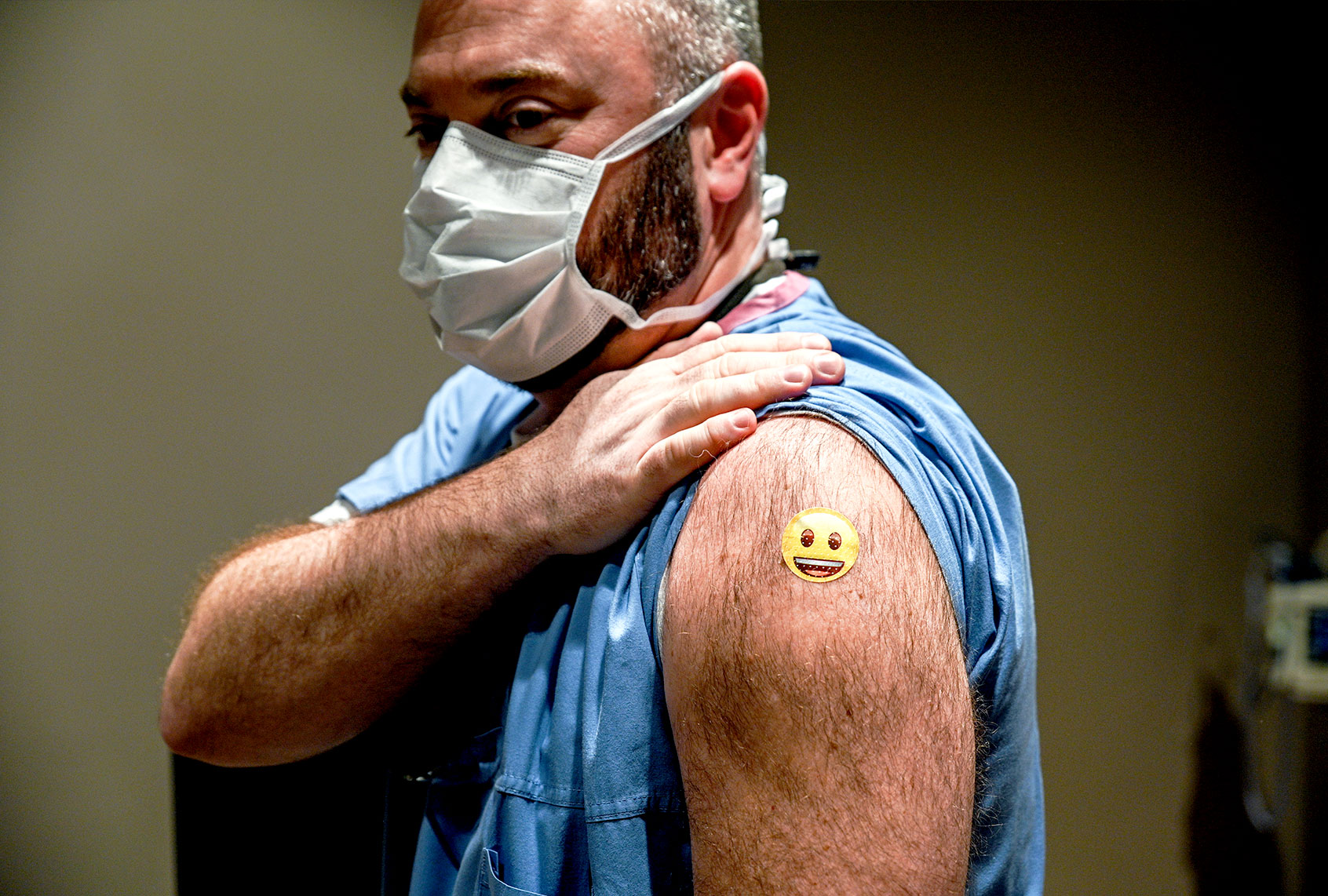On Monday Sandra Lindsay, a nurse and the director of patient services in the intensive care unit at Northwell Long Island Jewish Medical Center, received the first shot of the COVID-19 Pfizer/BioNTech vaccine in the U.S. outside of the mandated clinical trials. The hospital Lindsay works at in Queens, New York, has been at the epicenter of New York’s coronavirus crisis; it’s seen over 100,000 COVID patients.
“I’ve been hopeful today,” Lindsay said at the press conference with New York Governor Andrew Cuomo. “I feel like healing is coming. I hope this marks the beginning of the end in a very painful time in our history.”
Photos of healthcare workers getting vaccinated will certainly be something to hold on to during what has been, and will continue to be, a very dark and depressing winter. But naturally, the image has sparked a somewhat selfish question in most of us: Once the high-priority people get their vaccines, where and when can I get one, too? If you’ve felt like your patience has been stretched thin waiting this year, the beginning of 2021 is going to be no different — but knowing there is light at the end of the tunnel might make the final stretch easier.
Dr. Anthony Fauci, the director of the National Institute of Allergy and Infectious Diseases, told CNN last week that April might be “open season.” “In the sense of anyone, even the non-high priority groups could get vaccinated,” Fauci said, adding that it was a projection.
Health and Human Services Secretary Alex Azar reiterated this, saying, “We have enough vaccines already purchased to ensure we can meet our goal of vaccinating every American who wants it by the end of the second quarter of 2021.”
Bunny Ellerin, the Director of the Healthcare and Pharmaceutical Management Program at Columbia Business School, told Salon she’s optimistic about the vaccine being available to someone like her — a middle-aged person with no major comorbidities— by May 2021, but noted that doesn’t mean it will be available to everyone.
“Not every American is going to be able to get vaccinated because children are not approved for this, this is only for adults,” Ellerin said.
The Pfizer vaccine was only approved for people 16 and over.
As Salon has previously reported, prioritized healthcare workers will be the first cohort to receive the vaccine as it’s distributed across the country this week. According to the Wall Street Journal, 145 U.S. hospitals and other sites are expected to receive vaccine doses on Monday, followed by 425 on Tuesday, and 66 on Wednesday. But these numbers are just a drop in the ocean when compared to all the 328 million Americans there that will hypothetically need a vaccination for COVID-19 to go away and no longer manage our everyday lives.
The Centers for Disease and Control (CDC) is recommending that all healthcare personnel, and the frontline workers at long-term care facilities and their residents, are also vaccinated during this first phase. Healthcare personnel is defined as “all paid and unpaid people who serve in healthcare settings and have potential for direct or indirect exposure to patients or infectious materials.” In other words, anyone who works in a healthcare institution and has contact with an individual or testing materials. Residents of long-term care facilities are defined as “adults who live in facilities that provide a variety of services, including medical and personal care, to people who are unable to live independently.” Residents of long-term care facilities make up 40% of the country’s COVID-19 deaths.
Pfizer is sending out an estimated 2.9 million doses in the first wave of shipments this week, but by the end of December the company expects 25 million doses will be available — just enough to cover the estimated 21 million health care personnel, and 3 million long-term care residents across the country. The Pfizer vaccine will be given in a series of two doses, three weeks apart, but it provides some protection after the first dose.
These initial logistics pose challenges that will call for a highly organized effort to get the most prioritized people vaccinated. For example, Pfizer states on its website that its vaccine has a shorter shelf life of five days after being transferred from ultracold storage to a refrigerator. This leaves a short window to administer the vaccines. People also have to show up for the second dose.
But after the first phase of vaccine rollouts, many states are expected to subsequently prioritize people 65 and over and anyone with significant comorbidities, based on the CDC’s Advisory Committee on Immunization Practices (ACIP). These recommendations have been made to obtain three goals — to decrease death rates, preserve function of society, and reduce the burden COVID-19 is having on people already facing disparities. But who is prioritized outside of the high-risk categories will largely depend on where you live and your access to a healthcare provider.
“Given how the pandemic decimated many communities of color, I would hope that those communities are prioritized as well, since they were hit the hardest,” Ellerin said.
There are growing concerns around equal access to the vaccine. The hope is that with more vaccines approved, which is expected to happen starting with Moderna’s vaccine this week, there will be more supply to meet the demand, not just in the U.S. but around the world.
If you thought today’s news about healthcare workers meant you can finally ditch your quarantine life and start anew, we hate to disappoint. However, it does mean that you can start vision boarding what summer 2021 will look like, and that will be infinitely better than summer 2020.

